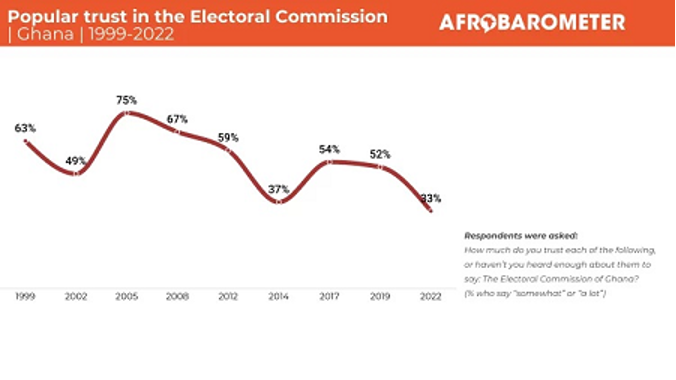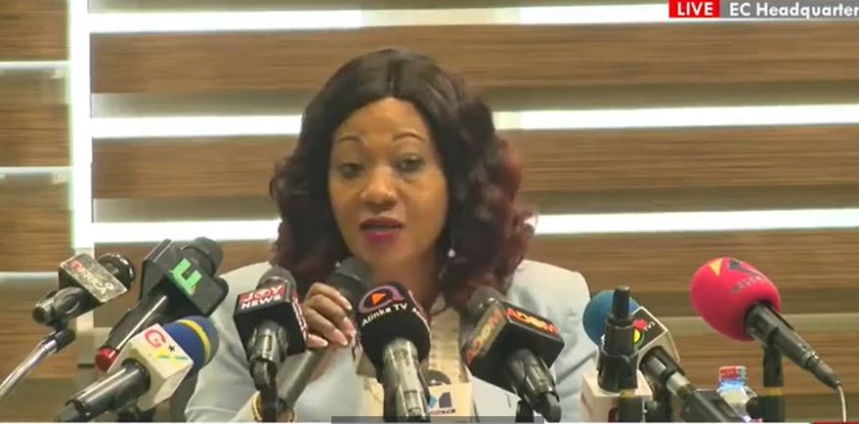In Ghana, the task of planning and directing elections falls to the Electoral Commission of Ghana (EC). The fairness and impartiality of the commission are essential to maintaining the integrity of the voting process. This essay analyzes the impartiality and fairness of the EC, stressing its shortcomings, obstacles, and opportunities for development.
Self-reliance and neutrality
The 1992 Constitution guarantees the impartiality and independence of the EC. The Commission is required to carry out its duties free from outside intervention or influence. However, the independence of the EC has come under fire on several times, with some stakeholders charging the commission with favouritism towards particular political parties.
Voter Verification and Registration
To guarantee the integrity and accuracy of voter registration, the EC has put in place a number of safeguards. The system for biometric voter registration, The Voter ID card linked to the age, name and polling station of an individual is much too similar to the KYC profile of most people held at the banks, Telco’s and utility companies in this country for it to receive anything other than standard data security protection. There is no reason to make it easy for people to scoop the data and automate its use for micro targeting, a situation more likely to facilitate abusive political telemarketing than to empower citizens.
Bad Technology Selection to the surprise of many IT governance experts, the EC then chose to use Google Drive to oversee the online publication process, as if this heinous display of negligence wasn't reckless enough.
It is well known that Google Drive's security measures for personally identifiable data are insufficient.
(See https://help.uis.cam.ac.uk/service/collaboration/g-suite/google-datasecurity for an example of thinking in action). Even worse if the data that is identifiable is also meant to be under government management. It is the height of irresponsibility to store, distribute, and permit redistribution of Government of Ghana data in a Google Drive folder using a regular G-suit license without the required certificates.
It is common knowledge that Google's more secure and compliant Government Cloud service does not include the entry-level G-suit services (a related discussion concerns this service's vulnerability to data corruption because of simple administrator access setups). view this conversation, which is different but insightful:
The compatibility of Google G Suite with Dfars NIST and ITAR security criteria is examined in the first portion of the compliance decisions and platforms section.
It is imperative that the EC watches it. There will undoubtedly be detrimental effects on this nation from this constant need to communicate to overcome its problems with credibility.
Graph showing population trust in the Electoral Commission


The EC's supporters and advisers have a strong incentive to advise it to adopt genuine accountability and openness. Every day that they replace the real thing with fake dramatizations, they erode the trust that is so vital to preserving the stability and peace of our democratic experiment in the unlikely event that another fiercely fought election results in tensions similar to those we witnessed in 2008.
Dispute Settlement Procedures
The Ghanaian Electoral Commission (EC) has put in place the following procedures to settle election-related disputes:
1. Complaints Review group: This group examines grievances pertaining to voting, voter registration, and tabulation.
2. Election-Related Conflict Resolution Mechanism: This mechanism offers a structure for settling election-related conflicts.
3. Arbitration: In order to resolve disputes, the EC may send them to arbitration.
4. Courts: Cases can be brought before the courts to be decided.
Challenges and Criticisms
Notwithstanding these safeguards, the EC has come under fire for its handling of election disputes because it is:
1. Slow: It has been said that the EC's dispute resolution procedure is too slow, which causes delays in the resolution of issues.
2. Biased: Some parties claim that the European Commission (EC) is biased in the way it handles electoral disputes, favouring particular political parties.
3. Lack of Transparency: It has been said that the EC's dispute settlement procedure lacks transparency, which makes it challenging for interested parties to comprehend the decision-making procedure.
4. Inadequate Resources: The European Commission has come under fire for not having enough resources to handle electoral disputes in an efficient manner.
Examples of Electoral Disputes
1. Voter registration disputes: Disputes related to voter registration, including challenges to the eligibility of voters.
2. Voting and counting disputes: Disputes related to voting and counting, including allegations of electoral malpractices.
3. Electoral boundary disputes: Disputes related to electoral boundary demarcations.
4. Candidate qualification disputes: Disputes related to the qualification of candidates to contest elections.
Recommendations for Improvement
1. Establish an independent dispute resolution body: To ensure impartiality and independence in dispute resolution.
2. Increase transparency: In the dispute resolution process to build trust and confidence.
3. Provide adequate resources: To ensure effective and efficient dispute resolution.
4. Establish clear guidelines: For dispute resolution to ensure consistency and predictability.
The Electoral Commission (EC) and Forensic Auditing
Because the Ghanaian Electoral Commission (EC) refused to submit to a forensic audit, there has been a great deal of discussion and apprehension regarding accountability and transparency in the electoral process. The absence of forensic auditing, which is an essential instrument for guaranteeing election integrity, has raised questions about electoral manipulation and wrongdoing.
A robust democracy must prioritize accountability and transparency, and forensic auditing is a vital tool for accomplishing these ends. Forensic auditing can assist in identifying possible anomalies, fraud, or manipulation by looking into the EC's financial transactions, electoral procedures, and decision-making. This in turn can guarantee that the people's will is reflected in election results and contribute to the development of public confidence in the electoral process.
Given the advantages of forensic auditing, the EC's resistance to it is perplexing. While some have conjectured that the EC might be concealing something, others think the commission is just attempting to uphold its independence. Independence does not, however, imply that the EC should be spared criticism. In actuality, the independence and credibility of the EC depend on openness and accountability.
Allegations of electoral misconduct, such as ballot stuffing, voter registration fraud, and election result manipulation, have arisen due to the lack of forensic auditing. These accusations have bred suspicion and mistrust among the populace, undermining their confidence in the voting process.In contrast, many electoral commissions around the world have embraced forensic auditing as a best practice. For example, the Electoral Commission of South Africa has undergone regular forensic audits, which have helped to identify and address potential irregularities. Similarly, the Independent National Electoral Commission of Nigeria has also adopted forensic auditing to ensure the integrity of its electoral processes.
In conclusion, the EC's refusal to undergo forensic auditing is a concerning trend that undermines transparency and accountability in Ghana's electoral process. The benefits of forensic auditing are clear, and its absence has led to allegations of electoral malpractices and undermined public trust. The EC must reconsider its stance and embrace forensic auditing to ensure the integrity of Ghana's elections and maintain public trust.
Recommendation to EC
To improve the Electoral Commission (EC) of Ghana's image, I recommend the following:
1. Embrace Transparency: Regularly publish financial reports, electoral processes, and decision-making procedures to demonstrate accountability.
2. Forensic Auditing: Subject the EC to regular forensic audits to ensure integrity and detect potential irregularities.
3. Stakeholder Engagement: Foster open communication with political parties, civil society, and the media to address concerns and build trust.
4. Capacity Building: Provide regular training for EC staff and officials to enhance their skills and knowledge.
5. Independent Oversight: Establish an independent body to oversee EC operations and ensure compliance with electoral laws.
6. Voter Education: Implement robust voter education programs to inform citizens about the electoral process and promote participation.
7. Technology Integration: Leverage technology to enhance electoral processes, such as online registration and electronic voting.
8. Complaints Resolution: Establish an efficient complaints resolution mechanism to address electoral disputes promptly.
9. Collaboration with International Organizations: Collaborate with international organizations to adopt best practices and improve electoral processes.
10. Regular Self-Assessment: Conduct regular self-assessments to identify areas for improvement and implement reforms.
Latest Stories
-
NGIS Anidaso Mutual Fund shares record 13.26% year-to-date yield
3 minutes -
MDF explores local poultry feed production to boost food security – Lands Minister
10 minutes -
1,345 galamsey suspects arrested since January 2025 – Lands Minister
15 minutes -
Illegal mining fight not easy, but we’ll definitely prevail – Lands Minister
18 minutes -
KATH courts BoG’s support to procure equipment for Catheterisation Lab
25 minutes -
EDC Investment boss warns retirees against costly financial mistakes
28 minutes -
NSMQ 2025: Parkoso SHS pulls out of Ashanti qualifiers
30 minutes -
NPA Fraud Case: Mustapha Hamid, co-accused granted GH¢2m bail each
34 minutes -
You have a responsibility to plan your retirement seriously – EDC’s Paul Mantey
38 minutes -
Lands Commission to decentralise services nationwide by year-end, says Minister
40 minutes -
Minerals Commission Act 85% complete in sweeping reform for equity and sustainability
50 minutes -
ICU-Ghana women’s wing holds 6th National Delegates’ Conference
51 minutes -
907 of 1,278 small-scale mining licences under review for revocation – Lands Minister
55 minutes -
Newly sworn-in MP for Ablekuma North, Ewurabena Aubynn appointed to serve on GSA Board
56 minutes -
55 small-scale mining licences revoked, 907 under review – Lands Minister
1 hour

